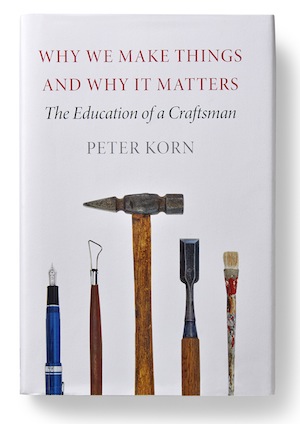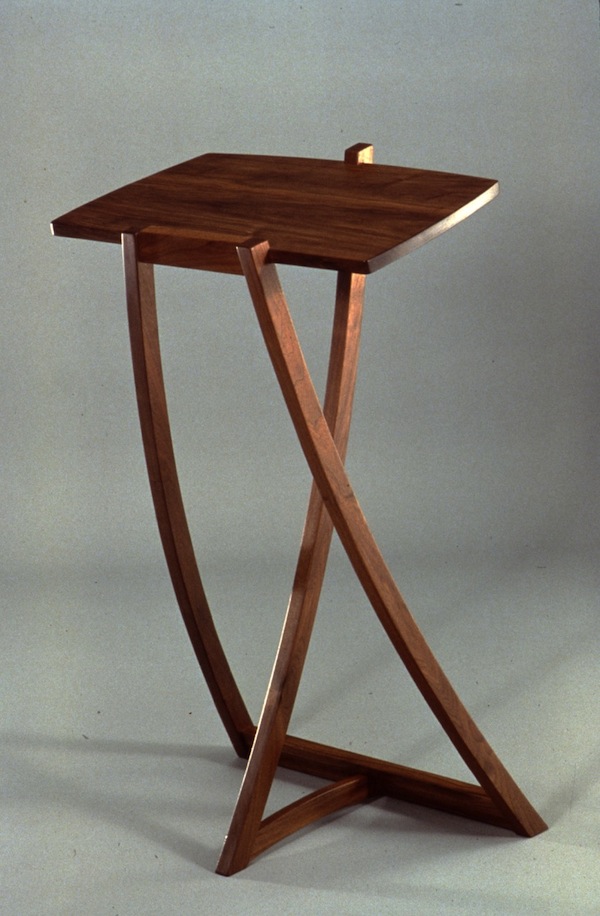One of the things I think about every day—partly because it’s about most of the work I do, but mostly because I always want to understand the why of everything—is creativity. What draws us to it? Why does it give us the kind of self-propulsion and satisfaction that, excluding the emotions of deep love, nothing else does? And what might be the connection between them — love and creativity?
I am hardly unique in this preoccupation. It is fundamental to us all (you know, the examined or unexamined life, etc.). Peter Korn, a lifelong American studio craftsman, furniture-maker and teacher, has written a book that attempts to codify this question of work and reward in layman’s terms through the prism of personal experience.
If I read the intent correctly, Korn has done this very much to satisfy his own curiosity, by looking back on and assessing his own life. But in the process he has opened it up to all of us, his readers. And he has done it in unpretentious, clear and graceful prose. His style is not academic and his ideas, while subjective, are entirely relatable.
The book’s title is unassuming to the point of sounding negligible: Why We Make Things And Why It Matters (David R. Godine, Publisher, 2013, available on Amazon and elsewhere). The opening and closing chapters—the ones in which Korn spends the most time telling us why making things matters to all of us, be they art, craft or the weaving of language—are by far the most engrossing. I would not say that the ideas themselves are especially groundbreaking, but Korn lays them out in a clear and thoughtful and sometimes urgent manner. He is well informed, well read and intimately acquainted with his craft. The joy for the reader lies in this craftsman/writer’s ability to strike so many responsive chords in others, whether they are engaged in the same or similar pursuits or in any other form of creative work.
One way he accomplishes this is by couching his explorations in a memoir of sorts. He tells us early and late that he is a child of his generation—the rebellious 1970s and 80s, when much in American life was undergoing dramatic change and breaking away from the strictures and expectations of the time. This generational rebellion was not only prevalent, but fashionable. Thanks in great part to the politics of the Vietnam War, protest in all its forms was widespread, and choosing (as Korn did) a highly individualized kind of life that promised to be difficult at best, was, he acknowledges now, both naïve and more than a little smug. He skillfully places all that in the context of his own experience, but also squarely in the wider context of the century, other movements in the arts and the tumult of the nation.
This intimacy, never overwrought, has the added merit of making the reader feel that he or she is engaged in conversation with a good friend. Korn is an artist-philosopher who cannot avoid turning his arguments into more general extrapolations on the pursuit of what he calls “a good life,” however we each ultimately define it.
“From the start,” he writes, “the hallmark of studio craft has been the motivation of its practitioners to seek identity, fulfillment, and meaning from within through creative self-expressive work.” Elsewhere he delineates: “There is a deep centeredness in trusting one’s hands, mind and imagination to work as a single, well-tuned instrument… What better way to inhabit one’s selfhood to the maximum than exercising one’s innate human capabilities productively and powerfully, like an engine firing smoothly on all pistons.”
Yes, it’s an idealistic vision and it applies to all forms of creative work—the creating, the sharing and the letting go. Among many reference points, Korn notes the Shaker view that “domestic life and work should be lived as sacraments.” That is a consummation devoutly to be wished, but how realistic is it in our dystopian world? This craftsman is enough of a realist to note the pitfalls that lurk everywhere and are never more than an arm’s length away. Making “things” provides certain immediate, urgent and individual satisfactions that working in a bank or a factory or corporation never will. But it also can (and does) upend lives, his own included.
The only other studio furniture maker I know of who found similar fulfillment in making things was lucky enough to not depend on that activity for his daily bread. As improbable as it sounds, Arthur Miller made his living writing plays; yet making “things” was significant enough to occupy a central spot in his thoughts and his actions. One of his plays, titled The Last Yankee, takes up this very issue of unsatisfying wealth vs. creative satisfaction, carefully pointing out that each has its perils. This small but compelling piece is very much worth reviving, extolling as it does (and without passing more than tacit judgment) the vanishing virtue of work that feeds the soul more than the pocketbook. It’s worth noting that the playwright remained a fine furniture-maker for all of his life. Apparently, he found that more immediately gratifying than writing plays, which needed to be staged before they could be shared, adding one more layer of frustration.
In the end, from the CEO to the Lawyer or the Engineer or the Scientist or the Doctor or the Philanthropist, we all yearn to matter, to leave a mark. Making “things” fulfills that deep-seated urge in the most representational, concrete and visible form. But so does cooking well. Or playing Hamlet well. Or performing a delicate operation well. I knew an admirable vascular surgeon whose office was filled with his sculptures, most of them made from objets trouvés. As another doctor of his acquaintance said to me: he doesn’t just operate; he sculpts. Bingo. And that’s the difference.
The deeper point is that creativity, in all its forms, makes it possible to leave a unique imprint of ourselves behind. The object is there—be it made of wood, metal, stone, oil paints, musical notes, words—or even flesh and blood. The meaning is in the doing. And as Korn lucidly and graciously demonstrates, it can take a lifetime to find that out.
Top image: Fluted Coffee Table by Peter Korn, walnut and maple (38”x16”x15”), 2008 Photo credit: Jim Dugan
Sylvie Drake is a trilingual translator and writer, who was born in Alexandria, Egypt. She has an MFA in directing from the Pasadena Playhouse, is a former theatre critic and columnist for the Los Angeles Times, serving as chief critic for the last three of a total of 23 years. She was invited to establish Prima Facie, the first new play festival for the Denver Center Theatre Company that continues to this day under a different name, and later served for several years as director of Media Relations & Publications for The Denver Center for the Performing Arts as well as advisor to the Denver Center Theatre Company. She was twice president of the Los Angeles Drama Critics Circle, is a current member of the American Theatre Critics Association and a current contributor to mindev.culturaldaily.com and other publications.
